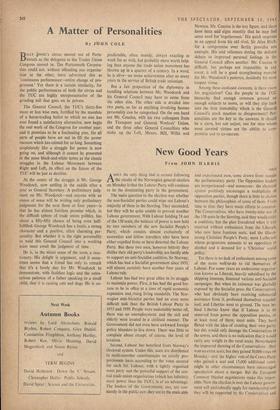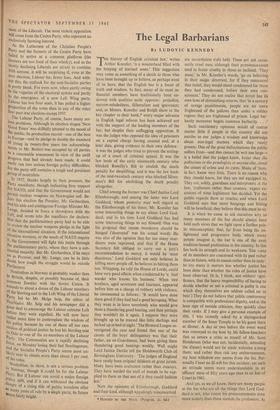New Good Years
From JOHN HARRIS
A BOUT the only thing that is certain following AA. the results of the Norwegian general election on Monday is that the Labour Party will continue to be the dominating party in the government.
The main question in the election was whether the non-Socialist parties could wipe out Labour's majority of three in the Storting. They succeeded, but they will be quite unable to prevent another Labour government. With Labour holding 74 out of the 150 scats, the balance of power is now held by two members of the new Socialist People's Party, which consists almost exclusively of neutralists and fellow travellers who have been either expelled from or have deserted the Labour Party. But these two men, however bitterly they dislike their old party's leadership, are hardly able to support an anti-Socialist coalition. So Norway, which has had a Socialist government since 1935, will almost certainly have another four years of Labour rule.
Labour has had two great allies in its struggle to maintain power. First, it has had the good for- tune to be in office at a time of rapid economic expansion and rising living standafds. The Nor- wegian anti-Socialist parties had an even more difficult task than the British Labour Party in 1955 and 1959. People were undeniably better off, there was no unemployment, and the sick and elderly were treated in a civilised manner. The Government did not even have awkward foreign policy blunders to live down. There was little to complain about except, of course, the level of taxation.
Second, Labour has benefited from Norway's electoral system. Under this, scats are distributed in multi-member constituencies on strictly pro- portionate basis according to the votes secured for each list. Labour, with a tightly organised mass party and the powerful support of the cen- tral trade union organisation (which has infinitely more power than the TUC), is at an advantage. The leaders of the Government, too, arc con- stantly in the public eye; they arc in the main able and experienced men, some drawn from outsidc the parliamentary party The Opposition leadcrt are inexperienced—and numerous : the electoral system positively encourages a multiplicity 01 opposition parties, though there is little to chobs( between the philosophies of some of them. Fron' time to time they have made efforts to combine The Conservatives, who have twenty-nine out 01 the 150 scats in the Storting, said they would entcl a coalition; but the plan foundered when it ‘va! received without enthusiasm from the Liberals who now have fourteen seats, and the fifteen! strong Christian People's Party, stern Lutheran! whose programme amounts to an opposition ti alcohol and a demand for a 'Christian' socia policy.
Yet there is no lack of enthusiasm among somt of the more well-to-do to rid themselves ol Labour. For some years an undercover organisa! lion known as Liberals, heavily subsidised by tilt shipping interests, financed various anti-Socialis campaigns. But when its existence was gleefull1 exposed by the Socialist press the Conservatives who had obviously been receiving substantia assistance from it, professed themselves scandal ised, and Libertas went to ground. The men be hind Libertas know that if Labour is to bt removed from power the opposition parties, 0 at least most of them, must unite. They hail flirted sith the idea .of creating their own party but this would only damage the Conservatives ii the towns, and there is no indication that it %void( carry any weight in the rural areas. Nevertheles the improved showing of the Conservatives the won no extra seats, but they gained 50,000 votes 01 Monda,■ ---and the higher vote of the Centre Part! who gained a seat and 15,000 additional I.!ote, might in other circumstances have encourage( speculation about a merger. But the Europeat Common Market negotiations make this impot, sible. Now the election is over the Labour govern mcnt will undoubtedly apply for membership ant they will be supported by the Conservatives in most of the Liberals. The most violent opposition Will come from the Centre Party, who represent an exclusively farming interest.
As the Lutherans of the Christian People's Party and the farmers of the Centre Party have failed to arrive at a common platform (the farmers are too fond of their whisky), and as the slowly declining Liberals are afraid to combine With anyone, it will be surprising if, even at the next election. Labour ha, fewer foes. And with- out this, the outlook for the anti-Socialist parties iS pretty bleak. For even now, when partly owing to the vagaries of the electoral system and partly to the emergence of a new Left Wing party, Labour has lost four seats, it has polled a higher proportion of the votes than in any of the other four post-war elections except 1957.
The Labour Party, of course, faces many ser- ious problems. Although its election slogan 'New Good Years was skilfully attuned to the mood of the Public, its production record—one of the best in Europe—and its pledge to double the standard of living in twenty-five years (no acknowledg- ments to Mr. Butler) was accepted by all parties as a reasonable assessment in view of the swift Progress that had already been made, it could easily run into serious foreign policy difficulties; for the party still contains a tough and persistent group of neutralists In 1957, thanks largely to their pressure, the ?arty manifesto, though indicating firm support for NATO, said that the Government would not Permit nuclear weapons on Norwegian soil. Be- fore this election the Premier, Mr. Gerhardsen, and his able and courageous Foreign Minister Mr. Lange, decided to force a showdown with the Left, and wrote into the manifesto the declara- tion that the parliamentary party had to be able to review the nuclear weapons pledge in the light of the international situation. If the international situation worsens, or the needs of NATO require It, the Government will fight this battle through the parliamentary party, where they have a sub- stantial majority. But Mr. Gerhardsen, if he stays ." as Premier, and Mr. Lange, can be in little doubt how tough the struggle would be outside Parliament.
Neutralism in Norway is probably weaker than in Britain, despite, or possibly because of, their common frontier with the Soviet Union. It extends to about a dozen of the Labour members of the Storting and to the Left Wing of the Liberal party led by Mr. Helge Seip, the editor of tiagbladet. Mr. Seip and his newspaper did a great deal to encourage the Labour extreme Left before they were expelled. He will now have rather more time to contemplate the wisdom of his Policy because by one of those all too rare strokes of political justice he lost his Storting seat in Oslo to one of the ex-members of the Labour 1)arty. The Communists are a rapidly declining force, on Monday losing their last Stortingsman; and the Socialist People's Party seems most un- ilkelY ever to obtain more than about 3 per cent. of the votes.
Neutralism, in short, is not a serious problem Lti Norway, though it could be for the Labour Party. But if Labour can avoid a major foreign Policy split, and if it can withstand the obvious danger of a rising tide of public boredom after So many years of rule by a single party, its future seems fairly bright.



































 Previous page
Previous page